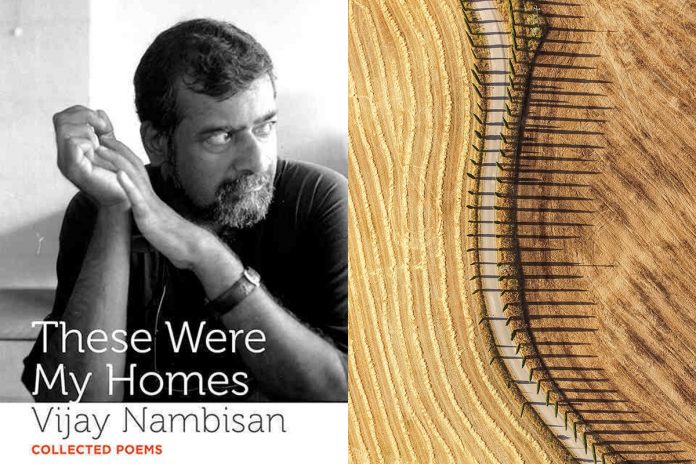These Were My Homes: Collected Poems – By Vijay Nambisan
Published by: Speaking Tiger Publications, Price : INR 499/
Book Review by Anjana Basu
To call Nambisan ‘the finest poet of his generation’ is now becoming something of a cliché. In the Bombay poetry world to which he belonged, he was somewhat unregarded because he was a quiet presence lost in a world of words, but he was the first to win a major and distinguished award, the All India Poetry Competition organised by India Poetry Society and the British Council, in 1990.
Many of his poems dealt with his lifelong tussle with the political scenario – but ended up gently poking fun at himself. He was unsettled by what he saw around him and sought ways to express it, whether by references to the Bible or to other traditions though there was always a deep sense of compassion underlying it all. Idealism and reality balanced themselves in his work though he was a man who gave up a bright future at the IIT to lose himself in verse. Possibly this was because he needed to delve into the innermost recesses of his being and an engineering career would not have allowed him to do that. He called it a space where answers were not always possible in which he knew himself as ‘unliving and unafraid’.
At one level his verses have a childlike simplicity about them and he has a poet or a child’s clear vision that enabled him to cut through pretension and opportunism. He could talk about how radium has its own soul and decays a little bit at a time exploring the metaphysics of science as he once did of crystal, or evoke the voice of a prophet – his imagination allowed him to inhabit all kinds of being. He also translated works from Malayalam – Poonthanam’s Jnana Paana – with equal cadenced vision, gently criticising Sanskrit’s demand to be regarded as the superior language. But then it was part and parcel of his disdain for the suited, booted people and those who are called the ‘corporate poets’.
He felt that at the core of it all lay integrity, the truth of the poetic vision. Not the images or even the words that he used with such fluidity. Without truth, language becomes a political tool, or so he felt, harking back perhaps to jesting Pilate’s, “What is truth?”. More importantly, in the current scenario, the inability to confront the truth gives way to the kind of delusions that are aired on social media with alarming frequency.
There is music in his work, rhymes and cadences that evoke earlier classic English poets but which some might say were not true to the essential Nambisan who prided himself on his economical usage of words. The poems in this collection follow the trail from the womb to the death bed with meditations on duck’s feet, cats arching their backs and human mortality.
For him poetry was a cause and it was inseparable from his way of living. Ultimately his system could not put up with the demands that his imagination made on it. These Were My Homes bring together his work for those who knew and admired him and those who did not and are yet to discover him. The past tense is telling because he no longer inhabits those homes. Rukmini Bhaiya Nair has given a perceptive introduction to the poetry collection.
Some poems from the collection are reproduced here:
The Miracle of the Pomegranate
Death of a Terrorist
Smell of Things to Come
About the reviewer:
Anjana Basu is a renowned novelist, poet, reviewer and travel writer.
















